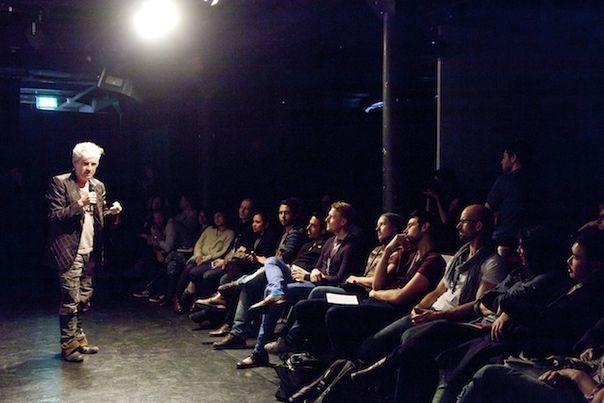In the Mood for Doyle
Claire Lee of the Talent Press 2014 interviews legendary director of photography Christopher Doyle at the Berlinale Talents summit 2014.

Christopher Doyle at Berlinale Talents 2014
Many often ask cinematographer Christopher Doyle how he chooses his movies. His answer is simple: it’s always the people. “Why would you spend time with someone you don’t love?”, he asks. Here are some of the people Doyle has worked with, people whom he considers important in his life and whom he counts among his friends: Wong Kar Wai (their collaborations include IN THE MOOD FOR LOVE and DAYS OF BEING WILD), Tilda Swinton (Doyle has known the actress since she was 19) and Chinese artist Ai Weiwei.
The celebrated Australian cinematographer, who sat down for a brief interview after attending a special Berlinale Talents session called “Every Picture Tells a Story” on Tuesday, said he likes to think people are good until proven otherwise. That's how he makes his friends, who also happen to be some of the most celebrated cineastes and artists today. “If you approach people that way, then you discover some amazing things”, Doyle said. “That’s what film is about. That’s how you engage with whom you work with. They sense that I care, they sense that they can give something to me with confidence. Then actors’ performances become more open, more energized and more true.”
Doyle, who is 61, is best known for his collaborations with some of the most iconic Asian filmmakers, including Zhang Yimou and Chen Kaige. He grew up in Sydney and moved to Asia at age 18. While he was attending University of Hong Kong in the late ‘70s, his professor gave him a Chinese name: Du Ke Feng. Doyle, who speaks Mandarin and Cantonese fluently, said that Du is the ideal version of Christopher Doyle. “I think Christopher Doyle wants to be Du Ke Feng”, he said. “But he’ll never get there. And that’s okay. I think it’s always good to aspire to be more than you are.”
Doyle said that he is a city person, and he loves the sea. Both Hong Kong – which Doyle describes as “the place I became what I am doing now” – and Sydney, where he grew up, are harbor cities. He thinks his optimism has a lot to do with growing up by the seaside, and with a lot of women in the house – he has four sisters. Cities (especially Hong Kong) and water have been his main source of inspiration. “I think the sea to me is women, the sea is a possibility. It embraces these depths, these wonderful rhythms that men don’t have,” he said.
Doyle, who has traveled extensively, said that being a filmmaker is similar to being multilingual. “As a filmmaker, you have to get into this polyglot kind of a space,” he said. “You have to get into a space where you are able to speak other languages. Other languages might be a film language, might be a language you structure a film. The more you travel, the more different kinds of people you work with, the better your films will be.” When asked what Wong Kar Wai looks like when he’s not wearing his sunglasses – Doyle said that, apart from Wong’s wife, he is the only person who has seen Wong’s eyes – he gave an answer that was short and clear: “Lost.”

